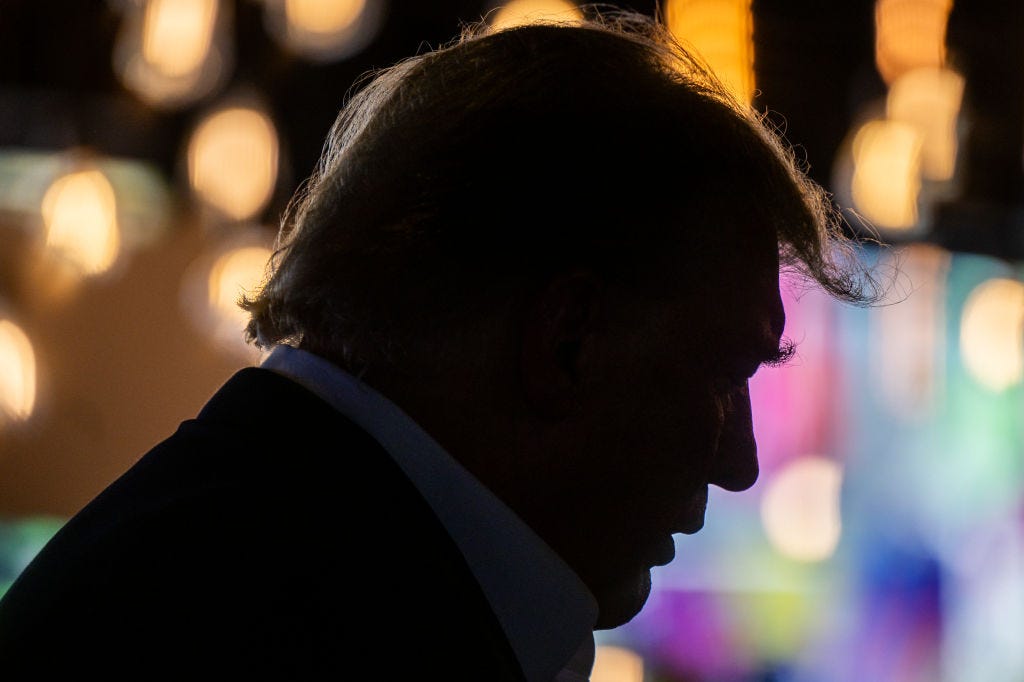Trump’s Inevitability Is Fake News
A Donald Trump nomination might seem inevitable, but in reality, he’s far from untouchable

This Wednesday marks the unofficial launch of the 2024 Republican presidential primary. With the first debate scheduled for that night, the candidates (sans the current frontrunner) will have their first chance to stand beside their fellow would-be nominees to make their case to what could be tens of millions of Republican primary voters.
With this milestone, it’s safe to say that most candidates who plan to enter the race have already done so, meaning that the field is pretty much set. Sure, there are hopeful dreams about white knight candidates riding in to disrupt the race, but that seems unlikely with some state filing deadlines rapidly approaching. Despite the fantasies of a few anti-Trump Republican insiders, there’s probably not going to be any miraculous entrance into the race at this point that will turn the race upside down.
For Donald Trump and his supporters, this seems like good news. Even with 10 or so competitors earning the requisite polling and contribution requirements to make it onto the debate stage, Trump still appears untouchable. In national polling of Republican primary voters, Trump typically gets over 50%. His closest competitor is Ron DeSantis, but national support for the Florida governor’s candidacy has dropped among GOP voters since his peak at the start of the year. After DeSantis are Vivek Ramaswamy, Mike Pence, Nikki Haley and Tim Scott, all of whom are still averaging in the single digits.
This general dynamic explains why Trump has said he doesn’t plan to attend the debate—and, potentially, none of them. He seems to be operating under the assumption that he has the nomination locked down, and from this perspective, attending the debates would only complicate what he sees as his inevitable march to victory.

But as he has a tendency to do, the former president has settled on a convenient but imprecise narrative. By leaving no room for uncertainty and taking it as a given that his dominance will remain uncontested, Trump has given his followers the false impression that we’re barreling toward a Biden/Trump rematch and that there’s no chance that the GOP could end up nominating anybody other than Trump.
While this outcome may indeed be the most likely right now, the idea that it’s inevitable is incorrect. Trump still has a long way to go before claiming the nomination, and there are a number of ways in which his coronation could be thwarted. With the first debate nearly here, and the question of Trump’s inevitability sure to be a topic of conversation there, now seems like a good time to explore the various reasons that the GOP primary could still be shaken up.
Five Major Roadblocks to a Trump Nomination
The first and most important bump in the road to a Trump nomination is that most Americans are not paying attention to the GOP primary as much as pundits and journalists (and probably you) are. Traditionally, the presidential campaign season didn’t really start until Labor Day the year before the election. And while that may have changed for campaigns themselves and for political obsessives, it has not changed for most Americans, who are spending more time enjoying the summer holiday than tuning in to the minutiae of political campaign drama. One explanation for Trump’s continued dominance is that many Republicans haven’t paid much attention to the primary yet and simply choose Trump in polls as a default. It’s easy to imagine some number of these voters being impressed with an alternative enough to abandon Trump, even if they still have warm feelings toward him.
The second reason to doubt the conventional wisdom about Trump’s inevitability is that the early primary states have the potential to shake up the entire contest. Iowa, New Hampshire, Nevada and South Carolina cast primary votes ahead of other states and are the best chance for non-Trump candidates to put a dent in Trump’s armor. If Trump doesn’t get a clean sweep in these early states—especially in Iowa and New Hampshire—then his inevitability will be put in question, opening up the door for another candidate (or candidates) to change the narrative and build momentum heading into the rest of the primary states. That is how underdog candidates in the past (Barack Obama in ’08, Bill Clinton in ’92 and Jimmy Carter in ’76) have overcome what at one point looked like seemingly insurmountable odds. Considering that Trump’s polling is weaker in Iowa than it is nationally, this looks like the most strategic path any of his competitors could take.
Third, the dynamics of the race could change as the field consolidates. At the moment, the non-Trump field is so divided that there is no one clear alternative to Trump, which makes differentiating and choosing between the non-Trump candidates a task that requires some real effort. Similarly, most of the money and time has been spent not attacking Trump, but on infighting among the non-Trump candidates vying to be the clear Trump alternative. More money has actually been spent attacking DeSantis than on Biden or Trump combined. Once the field narrows and there are just a few alternatives to Trump, it will be easier for voters to give these candidates a real look, rather than just seeing them as second-tier choices.
Fourth are Trump’s various legal issues. There is, of course, good reason to doubt that these could really pose a problem for Trump among the GOP base: Up to this point, the indictments and legal challenges have only strengthened Trump’s loyalty among Republicans, who see him as a kind of martyr who is facing unjust political prosecution. Even so, 52% of Republicans do say that they would not vote for Trump if he’s in prison—and that number is for a general election. It’s safe to assume that the number would be even lower in a primary, when there would be several Republican options presumably more palatable than a general election Democratic candidate. None of that is to say that Trump will likely be in prison on election day, but it’s definitely possible that he could very well lose support the closer he gets to facing serious legal consequences.
Fifth, and most immediately relevant, is that voters could be put off by Trump not even appearing to compete for their votes. In his first campaign and his presidency, Trump crafted the image of himself as a voice and fighter for the GOP base. But he risks that image when he acts as if GOP voters owe him the nomination even if he isn’t willing to show up to defend his ideas in a public forum. That’s the kind of entitlement that Republicans so hated in Hillary Clinton, and even the slightest hint of this in Trump could be toxic to his candidacy.
Ultimately, heading into this Wednesday’s debate, the main thing to keep in mind is that political campaigns are inherently uncertain. Anybody proclaiming that Trump’s nomination is inevitable either doesn’t understand that volatility or has an ulterior motive. Either way, you should take these overconfident assertions with a heavy dose of skepticism, remembering that there are many ways that Trump’s fortunes could turn between now and the GOP convention next June.





